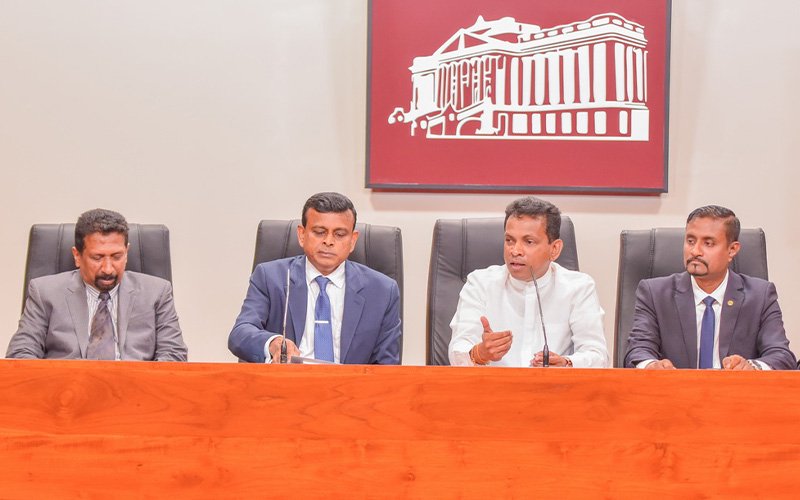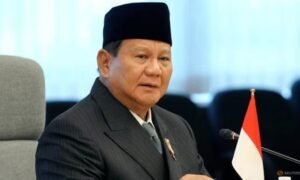
- An Urgent Program Implemented to Responsibly Utilize Valuable Mineral Resources for the Country’s Economy – Minister of State for Provincial Councils, Local Government, and Environment, Janaka Wakkambura.
- The Program aimed at “Conserving Ecosystems and Biodiversity” has Received International Recognition – Ministry Secretary.
- A Comprehensive Strategic Environmental Assessment Covering Sri Lanka as a Whole is Currently Underway – Chairman of the Central Environment Authority.
- Efforts to Digitize all Aspects of Mineral Resource Management – Chairman of the Geological Survey and Mines Bureau.
- Numerous Climate Change-Related Projects are Already in Progress – Additional Secretary for Environmental Development.
- A New Initiative to Enhance Air Quality has been Launched – Additional Secretary for Natural Resources.
State Minister for Provincial Councils, Local Government, and Environment, Janaka Wakkambura emphasized President Ranil Wickremesinghe’s directive not to repeal any environmental protection laws under any circumstances. He also announced plans to update the current Environment Act and introduce it alongside the Climate Change Act as a new Bill to Parliament.
State Minister Wakkambura made these remarks during a press conference titled “Two Years of Progress and Advancement” at the Presidential Media Centre today (16). He highlighted an urgent program aimed at economically benefiting the country while maintaining environmental sustainability.
Addressing the media briefing the State Minister further said,
When reflecting on the Ministry of Environment’s progress and future during a recent discussion, it’s important to note that our ministry’s activities may not always be as immediately visible as those of other government institutions. However, we have undertaken significant efforts in environmental conservation. Looking ahead, there are many crucial initiatives yet to be undertaken.
In line with the recent Environment Day celebrations, we launched an Island-wide Environment Week. As part of this initiative, over 01 million plants were planted across the country.
Our goal is to increase the current forest cover from 29% to 32% by 2030. To achieve this, we are employing new technologies to plant trees, especially in deforested areas. Additionally, for every tree removed under the ‘A Tree for a Tree’ project, a new tree is planted in non-intrusive locations.
President Ranil Wickremesinghe has shown increased commitment to environmental protection and climate change. Consequently, he has instructed against reversing any laws enacted to safeguard the environment under any circumstances.
Furthermore, plans are underway to update the current Environment Act and present it to Parliament alongside the Climate Change Act. Additionally, an urgent program has been initiated to harness the country’s valuable mineral resources for economic benefit in an environmentally sustainable manner.
Secretary of the Ministry of Environment Mr. B. K. Chandrakeerthi,
Under the vision of achieving a “sustainably developed Sri Lanka”, the Ministry of Environment has made significant strides over the past two years.
Firstly, efforts have been focused on developing the Dambulla Popum Arboretum while ensuring the sustainable conservation of ecosystems and biodiversity. Immediate actions have been taken to restore damaged mangrove ecosystems. Additionally, initiatives have commenced to transform Biodiversity Parks such as Bundala Pathirajawela and Kitulgala Belilena into Biodiversity Tourism Destinations within the Ratnapura Museum area.
Furthermore, measures have been implemented to control and manage invasive alien species across Sri Lanka. Recognizing Sri Lanka’s dedication to sustainable conservation efforts, our country was honored as the ‘Global Leader in Mangrove Conservation’ at the United Nations Environment Conference.
The Environmental Pollution Control and Chemicals Management Division has been active in environmentally friendly management and disposal projects for polychlorinated biphenyl waste, polychlorinated equipment, and plastic waste. Programs are also in place to prevent and reduce plastic waste generation.
Currently, there is a capacity development initiative underway in the Asia-Pacific region for the environmentally friendly management of single-use plastics and their waste. Additionally, national projects are being implemented to reduce mercury-containing and mercury-mixed waste under the Minamata Convention.
Upcoming projects include Institutional Strengthening for Proper Management of Chemicals and Wastes, and Environmentally Friendly Disposal of Persistent Organic Pollutants used in Sri Lanka’s agriculture sector, as well as mercury and waste management in healthcare sectors.
Development programs also encompass awareness campaigns for ‘Green Schools, Green Institutions, and Green Hospitals’, the launch of a National Communication Program on Plastic Waste Management, initiatives to control water pollution in Diyawanna Oya, and the formulation of a national policy on managing electrical and electronic waste in Sri Lanka very soon.
Additional Secretary (Environmental development) R.D. S. Jayathunge,
President Ranil Wickremesinghe has prioritized addressing climate change, leading to the initiation of several urgent projects. Among these, the project (CBIT/AFOLU) is currently developing a framework to enhance transparency in agriculture, forests, and land use. Additionally, Sri Lanka has prepared its first and second biennial transparency reports and the fourth national communication report for the United Nations Framework Convention on Climate Change.
Furthermore, efforts are ongoing to implement and build capacity for Sri Lanka’s National Adaptation Plan (NAP), integrate climate change into provincial development plans, and formulate provincial adaptation plans. Workshops are being conducted for officials across ministries and agencies to enhance their ability to draft project concept papers for submission to the Green Climate Fund (GCF).
Moreover, Sri Lanka is actively involved in the Accelerating Industries Climate Response (EU Project) and the 3rd NDA Readiness Project.
Additional secretary (Natural Resources) W.D.S.C. Weliwatte,
The Ministry of Environment’s Natural Resources Division is currently executing the Healthy Landscape Project-2021-2024 and overseeing the monitoring and reporting project for the United Nations Convention to Combat Desertification.
Additionally, with technical support from the French government, a project is in progress to identify Colombo’s most vulnerable areas to air pollution and enhance air quality.
Chairman, Central Environmental Authority Venura Fernando,
It’s recognized that merely having rules and regulations isn’t enough to effectively protect the environment; we need to foster an “environmental culture”. To achieve this, programs have been initiated at school, university, and teacher training levels. Our information center has been fully digitized to enhance library facilities and provide access to environmental knowledge both nationally and internationally.
The Central Environment Authority has also taken steps to amend the National Environmental Act and manage polythene and plastic waste. The annual Presidential Environment Award plays a crucial role in raising environmental awareness among the public. We’ve implemented special waste management programs during Sri Pada pilgrimage and launched e-waste collection at 97 centers across Western, Southern, Eastern, and Uva provinces. Designating “Ethaleikulam” Lake and “Warnagalawatta” Environmental Protection Areas’ and transforming all railway stations into eco-friendly ones are among our notable achievements.
Furthermore, we’ve established a 24-hour hotline (1981) for environmental complaints and are collaborating with the Sri Lanka Police Department to set up an environmental complaints unit. Under President Ranil Wickremesinghe’s guidance, the Central Environment Authority is conducting a strategic environmental assessment for Sri Lanka, currently in its preliminary phase. This assessment evaluates the environmental impact of plans, policies, or programs, ensuring necessary approvals are obtained efficiently and project implementation time is minimized.
Chairman, Geological Survey and Mines Bureau Kithsiri Manchanayake,
A lot of attention has been paid to our country’s mineral resources by both local and foreign investors. We are directly intervening with the relevant institutions to make the necessary arrangements without interruption and delay.
Also, through digitalization of all aspects related to mineral resource management, which has been started now, it will be possible to get our mineral deposits and related updated information from any country in the world. Thus, we are working to support Sri Lanka’s valuable mineral resources to contribute to the country’s economy in an environmentally friendly manner.
A group of officials representing the Ministry of Environment, Central Environment Authority, Bureau of Geology and Mines and Sri Lanka Climate Fund (SLF) participated in the event.








